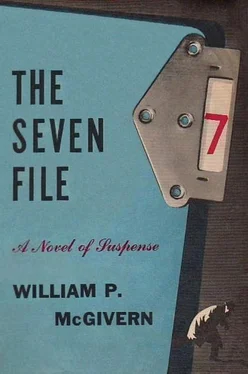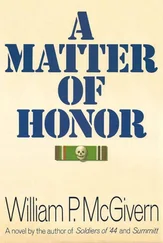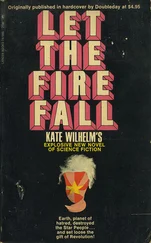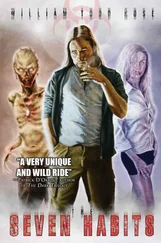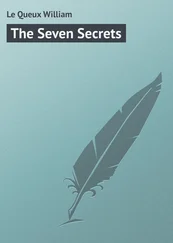William McGivern - The Seven File
Здесь есть возможность читать онлайн «William McGivern - The Seven File» весь текст электронной книги совершенно бесплатно (целиком полную версию без сокращений). В некоторых случаях можно слушать аудио, скачать через торрент в формате fb2 и присутствует краткое содержание. Город: New York, Год выпуска: 1956, Издательство: Dodd, Mead & Company, Жанр: Криминальный детектив, на английском языке. Описание произведения, (предисловие) а так же отзывы посетителей доступны на портале библиотеки ЛибКат.
- Название:The Seven File
- Автор:
- Издательство:Dodd, Mead & Company
- Жанр:
- Год:1956
- Город:New York
- ISBN:нет данных
- Рейтинг книги:4 / 5. Голосов: 1
-
Избранное:Добавить в избранное
- Отзывы:
-
Ваша оценка:
- 80
- 1
- 2
- 3
- 4
- 5
The Seven File: краткое содержание, описание и аннотация
Предлагаем к чтению аннотацию, описание, краткое содержание или предисловие (зависит от того, что написал сам автор книги «The Seven File»). Если вы не нашли необходимую информацию о книге — напишите в комментариях, мы постараемся отыскать её.
The Seven File — читать онлайн бесплатно полную книгу (весь текст) целиком
Ниже представлен текст книги, разбитый по страницам. Система сохранения места последней прочитанной страницы, позволяет с удобством читать онлайн бесплатно книгу «The Seven File», без необходимости каждый раз заново искать на чём Вы остановились. Поставьте закладку, и сможете в любой момент перейти на страницу, на которой закончили чтение.
Интервал:
Закладка:
“I don’t know,” Hank said. “But I want to see him. There isn’t much time left.”
“Time for what?”
Hank shrugged wearily. “I don’t know. It’s just the way I feel.”
“All right then,” the Inspector said, turning to his desk. “I’ll arrange it.” He was reaching for the phone when it began to ring. “Excuse me,” he said, lifting the receiver. “Hello, this is West.” The Inspector listened a moment, nodding slowly. Then he said, “When was this? All right... thanks very much. Yes, yes, of course. Good-by.”
Frowning faintly, West put the receiver back into its cradle. He stared at the top of the desk for a few seconds, then sighed and looked up at Hank. “I don’t know whether this will be good or bad news for you, son.”
“What happened?”
“Your brother died a few minutes ago,” West said quietly. “He complained of a pain in his chest after dinner. He suffered two heart attacks within half an hour. He didn’t recover from the last one.”
“He’s dead?”
“Yes. The doctor said his heart must have been in bad shape for some time. I don’t suppose he’d had a check-up lately.”
“Check-up? No, I’m sure he hadn’t. He — he didn’t have much use for doctors.” Hank stood perfectly still, staring out the window behind the sheriff’s desk. He saw the branches of a maple tree stirring slowly in the darkness, and beyond that the lights of the village, shining in the night. “And he’s dead now,” he said softly. The fact was almost impossible to credit; it was as if half of himself had died. Even when he was away from Duke he had never been free from the dark, insistent presence; he had carried his brother with him all his life. Now the burden had been lifted and he knew he would miss it — ache for it at times.
Hank turned toward the door and Inspector West came after him and put a hand on his arm. “Why don’t you stay here and have supper with me?”
“Thanks — I think I’d rather go home.”
“We won’t make a production out of it,” West said. “Just a steak and a bottle of beer. How about it?”
“Can’t I take a rain check on it?”
“Of course you can. But I thought you might want to talk a while.”
Hank shook his head slowly. “There’s nothing to talk about. It just doesn’t make any sense to me. My brother was—” He shrugged tiredly, realizing the futility of explanations. “He was trouble,” he said bitterly. “For himself, for everybody. He could have been anything. He said that after I shot him. It was true. Instead he was trouble. Two hundred pounds of trouble, swinging crazily at anything in its way. Does that make any sense to you?”
“I don’t have any snap answers,” West said. “In my job I’ve seen all kinds of people, all kinds of evil. When I was younger I kept watching for a pattern in human behavior, an equation that would make it all clear and significant to me. I thought I could find a few words that might explain all the mysteries and contradictions I kept running up against. But I never found those words. Now I know I never will.”
“So it makes no sense to you either?”
“I didn’t say that. I’ve found out this much, Hank. Sometimes evil is clear and understandable. Sometimes it makes no sense at all. But it’s still our responsibility to face it — as you’ve done. Someone else may understand it. Someone with perfect understanding. Do you know what I mean? With that kind of understanding there may be sympathy, even forgiveness.”
Hank was silent for a moment or so, and then he smiled faintly at the Inspector. “I’ll be at the lodge if you need me. Good night.”
“There’s one other thing.” West stepped across the room and took a wallet from the middle drawer of the sheriff’s desk. “This belonged to your brother,” he said. “It was all he had on him. I thought you might like to take it along.”
Hank hesitated a moment, staring at the worn, black leather wallet. “Yes, I’ll take it along,” he said, and when he spoke he felt the sudden tightness in his throat. “So long, Inspector.”
“You’ve got a rain check on that steak, remember.”
“I won’t forget.” Hank smiled quickly at him and left the office.
Half an hour later Hank crossed the porch of the lodge and fitted his key into the lock. He hesitated then, glancing over his shoulder at the dark shadows that crowded the house. The parking light on his car was a futile yellow gleam against the night; he could just see the white curve of the gravel road, and the uneven silhouettes of fir trees against the black skyline. The woods were quiet and unmoving; the faint wash of the water and the far-off cry of a hunting owl were harsh sounds against the unstirring silence.
Hank stared around, listening; it would be like this for a long time, he realized. When he came up here he would be watching for movement in the shadows beside the porch, cocking his head toward a snapping twig or the sudden rustle of a bird in the trees. Finally he opened the door and went inside. The silence in the house struck him as unnatural; he became aware that he was holding his breath, listening for a soft footstep on the stairs, the sound of whispering, conspiring voices in the kitchen.
Someone had put everything in order. Probably Sheriff Davis had sent a woman out, he thought. The floor was scrubbed clean, the lamps and chairs had been straightened, embers glowed faintly in the fireplace. But you couldn’t get rid of ghosts with soap and water, he thought; the house was like a big empty stage, ready and waiting for actors to make their entrances.
Hank rubbed both hands over his face. There would be no entrances; he was letting his nerves run riot. Duke wouldn’t saunter in from the kitchen, a grin on his dark face, his eyes alert for trouble. Duke was dead. And Belle and Grant were gone. He might write Belle’s son some day, he thought. Soften it a little. She had helped at the end.
Hank walked slowly across the room and put another log on the hot ashes. With a hand resting on the mantel he watched smoke curl around the log, and the little spears of fire attacking the dry bark. Finally the wood crackled and burst into flames, and the draft shot up the chimney with a breathless roar. He stood watching the fire, not knowing what to do next; he was hungry but he didn’t want to eat, he was exhausted but he couldn’t sleep. After a while he sighed and took Duke’s wallet from his pocket. He turned it around in his hands, examining the dry cracks along the fold, the broken stitches in the seams. Inside there was a five-dollar bill, and a collection of business cards under a celluloid shield. Five dollars... a bottle and a package of cigarettes. The cards were without significance; a liquor store that promised night and day deliveries, a garage, a men’s clothing shop with a salesman’s name printed in the right-hand comer.
One compartment of the wallet was zippered shut. Hank opened it and removed a carefully wrapped packet that was about the size of a playing card. A faint memory tugged at him. Turning toward the light, he saw that the packet contained a snapshot protected by layers of fine tissue paper. He had seen this before... he remembered the look of the blurred features through the paper. He had found this picture in Duke’s drawer, rummaging about with a child’s pointless curiosity. And Duke had caught him. Unconsciously Hank’s fingers moved up to trace the scar on his forehead. What had Duke hit him with? A tennis racket...
Hank removed the layers of silk-smooth paper, and studied the snapshot of Duke’s mother. She had been in her middle twenties when this picture was taken, more girl than woman, awkward and shy, pretty, with long, dark hair and a thin, animated face. The print was hazy and blurred, but he could see her clear, direct eyes and the little smile pulling at her full lips. She wore a print housedress with a soft, round collar. She looked friendly but somewhat tentative, as if she might be uncomfortable with people until she got used to them. She had only completed one year of high school. His mother had told him that, he remembered.
Читать дальшеИнтервал:
Закладка:
Похожие книги на «The Seven File»
Представляем Вашему вниманию похожие книги на «The Seven File» списком для выбора. Мы отобрали схожую по названию и смыслу литературу в надежде предоставить читателям больше вариантов отыскать новые, интересные, ещё непрочитанные произведения.
Обсуждение, отзывы о книге «The Seven File» и просто собственные мнения читателей. Оставьте ваши комментарии, напишите, что Вы думаете о произведении, его смысле или главных героях. Укажите что конкретно понравилось, а что нет, и почему Вы так считаете.
